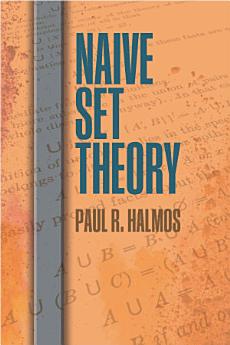Naive Set Theory
এপ্ৰিল ২০১৭ · Courier Dover Publications
৪.৩star
৩ টা পৰ্যালোচনাreport
ইবুক
112
পৃষ্ঠা
reportমূল্যাংকন আৰু পৰ্যালোচনা সত্যাপন কৰা হোৱা নাই অধিক জানক
এই ইবুকখনৰ বিষয়ে
This classic by one of the twentieth century's most prominent mathematicians offers a concise introduction to set theory. Suitable for advanced undergraduates and graduate students in mathematics, it employs the language and notation of informal mathematics. There are very few displayed theorems; most of the facts are stated in simple terms, followed by a sketch of the proof. Only a few exercises are designated as such since the book itself is an ongoing series of exercises with hints. The treatment covers the basic concepts of set theory, cardinal numbers, transfinite methods, and a good deal more in 25 brief chapters.
"This book is a very specialized but broadly useful introduction to set theory. It is aimed at 'the beginning student of advanced mathematics' … who wants to understand the set-theoretic underpinnings of the mathematics he already knows or will learn soon. It is also useful to the professional mathematician who knew these underpinnings at one time but has now forgotten exactly how they go. … A good reference for how set theory is used in other parts of mathematics." — Allen Stenger, The Mathematical Association of America, September 2011.
"This book is a very specialized but broadly useful introduction to set theory. It is aimed at 'the beginning student of advanced mathematics' … who wants to understand the set-theoretic underpinnings of the mathematics he already knows or will learn soon. It is also useful to the professional mathematician who knew these underpinnings at one time but has now forgotten exactly how they go. … A good reference for how set theory is used in other parts of mathematics." — Allen Stenger, The Mathematical Association of America, September 2011.
মূল্যাংকন আৰু পৰ্যালোচনাসমূহ
৪.৩
৩ টা পৰ্যালোচনা
লিখকৰ বিষয়ে
Hungarian-born Paul R. Halmos (1916–2006) is widely regarded as a top-notch expositor of mathematics. He taught at the University of Chicago and the University of Michigan as well as other universities and made significant contributions to several areas of mathematics including mathematical logic, probability theory, ergodic theory, and functional analysis.
এই ইবুকখনক মূল্যাংকন কৰক
আমাক আপোনাৰ মতামত জনাওক।
পঢ়াৰ নির্দেশাৱলী
স্মাৰ্টফ’ন আৰু টেবলেট
Android আৰু iPad/iPhoneৰ বাবে Google Play Books এপটো ইনষ্টল কৰক। ই স্বয়ংক্রিয়ভাৱে আপোনাৰ একাউণ্টৰ সৈতে ছিংক হয় আৰু আপুনি য'তে নাথাকক ত'তেই কোনো অডিঅ'বুক অনলাইন বা অফলাইনত শুনিবলৈ সুবিধা দিয়ে।
লেপটপ আৰু কম্পিউটাৰ
আপুনি কম্পিউটাৰৰ ৱেব ব্রাউজাৰ ব্যৱহাৰ কৰি Google Playত কিনা অডিঅ'বুকসমূহ শুনিব পাৰে।
ই-ৰীডাৰ আৰু অন্য ডিভাইচ
Kobo eReadersৰ দৰে ই-চিয়াঁহীৰ ডিভাইচসমূহত পঢ়িবলৈ, আপুনি এটা ফাইল ডাউনল’ড কৰি সেইটো আপোনাৰ ডিভাইচলৈ স্থানান্তৰণ কৰিব লাগিব। সমৰ্থিত ই-ৰিডাৰলৈ ফাইলটো কেনেকৈ স্থানান্তৰ কৰিব জানিবলৈ সহায় কেন্দ্ৰত থকা সবিশেষ নিৰ্দেশাৱলী চাওক।







